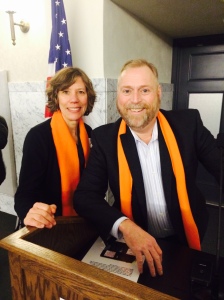By Laura Shepard, FamilyWorks Volunteer
Jake Weber, FamilyWorks Executive Director and FamilyWorks Food Bank Manager Mike Cox attended the 2015 Hunger Action Day on Monday in Olympia with members of other anti-hunger organizations to lobby legislators or their staff members to support anti-hunger programs and legislation.
There was a great lineup of advocates from the 37th legislative district who highlighted the fact that economic recovery is not translating instantly into better food security for Washington Families.
One of those speakers was a 4th grade girl representing kids all around the state who spoke on behalf of the Breakfast after the Bell bill, which would provide free breakfast to all students. She was soft spoken but confident.
“The legislators really paid attention to her- she made the point that it is hard to learn when one is hungry in school,” said Mike.
“She is a hunger advocate as we all should be,” added Jake.
Mike Cox was one of the speakers and he shared that 1 in 5 Washington Residents use food banks, and over 1/2 of participants served are either elderly or children. Mike pointed out that, alarmingly, in 2014 food bank visits actually rose with the highest growth in new participants coming from the elderly and children.
The main cause for the current upswing is no mystery – cuts in federal and state food assistance programs have made food banks more critical to more people than ever. The improving economy is cited as justification for quickly cutting federal and state food assistance programs, however it takes time for an improving economy to translate to food security for a household, and a recent upswing in unemployment has new participants applying to all forms of national, state and local food assistance options.
As major food assistance programs cut funding, food banks are stepping in to try and fill the gap. However, that gap is a big one. Food banks in Washington are struggling to meet growing demands, and this is reflected in the drop in total volume of food available to each participant on a per visit basis.
You can help!
- Donate Funds – see how your donation of cash, goods or services can make a huge difference
- Volunteer – Give your time for food drives, sorting, driving or administrative functions
- Advocate – Click here to find out how you can contact WA legislators and support legislation that helps people who are hungry
- Tell your story – Legislators need to understand the full impact of being underemployed or being homebound and the frustration of not being able to get fresh greens in months
Thank you!

